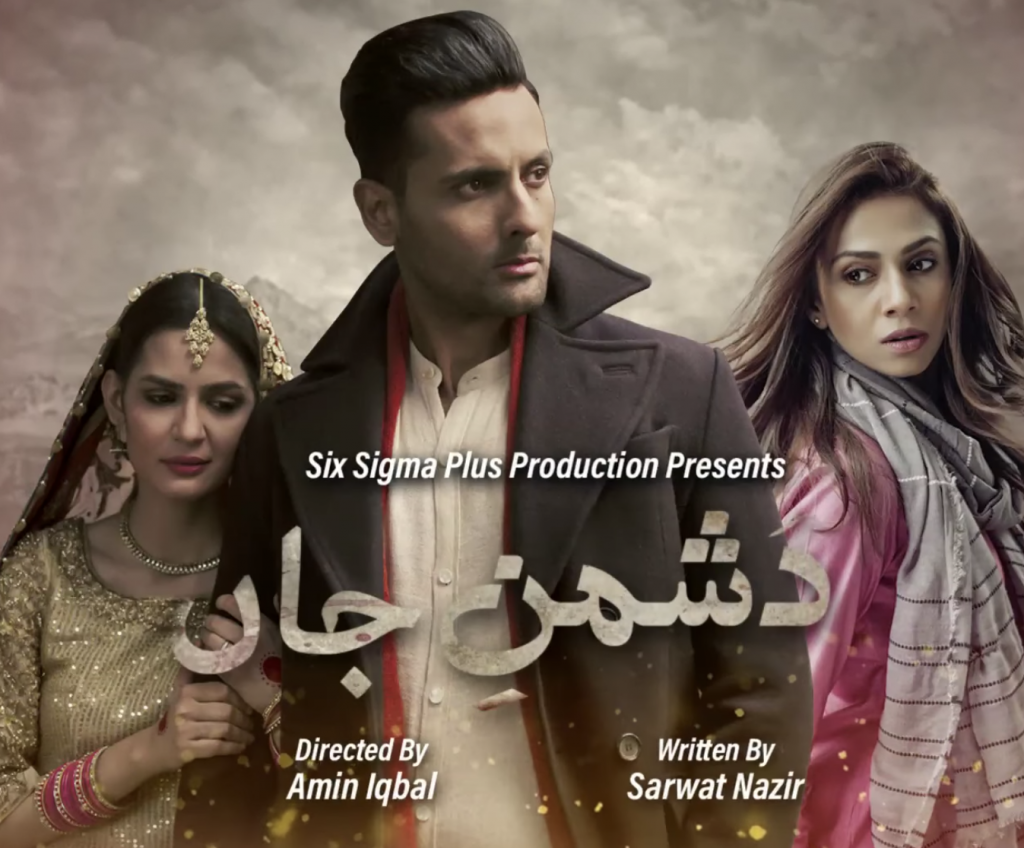It’s been difficult to review Dushman-e-Jaan due to the almost-daily airing schedule. It stars Mohib Mirza, Tooba Siddiqui and Madiha Imam in lead roles, airs Monday to Thursday, which means it’s on four days a week. While it’s usually my opinion to avoid such shows as they tend to be sluggish and repetitive, this show is the exception. Not only is the story compelling, the acting is great and the show is presented in a slick way with high production values.
To quickly recap the past few weeks of episodes, the story revolves around Haatim (Mohib Mirza), a slightly arrogant man who has emotional issues due to neglect from his parents. He encounters Ramsha (Tooba Siddiqui) at work, a hard-working, driven employee who works as the head of family for her household and the two immediately face off. However, over time as they begin to form a bond, Haatim has a misunderstanding and puts Ramsha’s life in danger – an action that has a disastrous, tragic outcome. Now Haatim struggles to make things right by trying to protect Ramsha’s family.
Read: Dushman-e-Jaan – unintentionally addictive!
Much of episode 14 focuses on Zaheer and Rukhsana (Farah Tufail). Up until now, Rukhsana has been the sort of character that girls could potentially relate to (on a level). While she was sly and managed to “trap” the already engaged Zaheer, upon entering his home, she did try her best to be a good daughter-in-law. Sure, she can’t cook or clean, but this daughter-in-law is willing to hire domestic help from her own salary to care for her in-laws needs. There isn’t any food in the house? She offers to get food from outside. Her in-laws complain about her using the word “yaar” with her husband? At this point, any rational girl will think “OK saasu maa and sasur ji, please calm down and stop being so picky.”
Watch Episode 14 of Dushman-e-Jaan here.
Up until this point, there was absolutely no issue with Rukhsana. However, in episode 14, she suddenly loses her mind entirely. She insinuates that Zaheer is having an affair with Ramsha, a woman he rejected himself. She insults her in-laws. She essentially turns into the daughter-in-law from hell for no reason whatsoever. Once in a while, it would be nice to see a working woman depicted as a normal person, but even here, Rubab is highlighted to show the “opposite option” of Rukhsana.
Given, Ramsha was well-written in Dushman-e-Jaan, but she’s also no longer on the show, so the point still stands. Working women are not “bad people” and it’s a little disappointing to see Rukhsana turn out this way, set to leave Zaheer’s life after asking for a divorce.
Meanwhile, Rubab (Madiha Imam) and Haatim have returned from the hospital after Rameez’s successful kidney transplant. The happiness is short-lived when Rubab realizes her father is arranging her marriage to an older man with grown children.
Irfan Khoosat’s character is a bit odd here, because he’s willing to arrange his young daughter’s marriage to an absolute stranger with baggage, but his “izzat” comes into play when his brother-in-law asks for Rubab’s hand in marriage again – not that either situation is a good one, but the outrage at one and not the other is strange. Mohib Mirza and Madiha Imam act well in this episode and share a sweet sort of chemistry that makes the viewer want to root for Haatim and Rubab….sort of?
What’s great about this show is that it does not drag. It has strong content and something eventful happens in almost each episode. It also must be said that the way the story has been written deserves full credit. Sarwat Nazir has given us a story that is unsettling and yet we find ourselves invested in the characters. In any other situation, Haatim would be a character to loathe – but despite the gravity and severity of his actions, he still evokes sympathy.
It’s almost an ethical dilemma for the audience, because his actions are good – but his past actions destroyed an innocent girl and an entire family. Is forgiveness even possible in such a situation? The fact that we are able to ask ourselves these questions and not come up with a clear answer is exactly why this show is being embraced. It offers something new to audiences that have been starved for a show with a little more depth and intelligence than simply saas-bahu drama (though that angle has certainly been included with Rukhsana). It can’t be said how the story will play out from this point onward, but so far, this show lands itself on the list of best shows currently on air.
